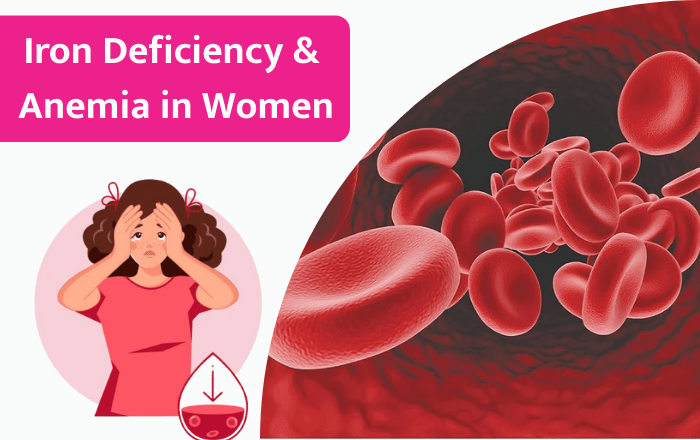Feeling tired all the time? Struggling to focus or getting dizzy often? You’re not alone—and your body might be trying to tell you something.
Iron deficiency anemia is one of the most common health issues faced by women, especially during their childbearing years. It doesn’t always shout; sometimes it whispers through everyday symptoms like fatigue, pale skin, or frequent headaches.
In this blog, we’ll walk you through the causes, signs, and ways to prevent iron deficiency anemia in women. Whether you’re a working professional, a mom, or a student, understanding this condition can make a big difference to how you feel every day.
What is Iron Deficiency Anemia?
Iron deficiency anemia happens when your body doesn’t have enough iron to make healthy red blood cells. These cells carry oxygen, and without enough of them, your organs and muscles don’t get the oxygen they need. This can leave you feeling weak, tired, and often out of breath.
Iron deficiency is the most common type of anemia, and it tends to affect women more than men due to factors like menstruation, pregnancy, and diet choices.
Why Are Women More at Risk?
There are several reasons women are more likely to develop iron deficiency anemia:
1. Monthly Menstrual Cycle
Women lose iron every month during their periods. Heavier periods mean more iron is lost, which can increase the risk of becoming anemic over time.
2. Pregnancy and Breastfeeding
During pregnancy, your body needs more iron to support both you and your growing baby. If you’re not getting enough iron from food or supplements, your levels can drop quickly.
3. Iron-Poor Diet
Women who follow vegetarian or low-meat diets may not get enough iron from food alone, especially if the diet lacks iron-rich plant foods.
4. Health Conditions
Issues like uterine fibroids or other causes of heavy bleeding can also contribute to long-term iron loss.
Common Symptoms You Shouldn’t Ignore
Iron deficiency can sneak up slowly, so it’s important to notice the signs. Here are some common symptoms:
- Constant tiredness or weakness
- Pale skin or dark circles under the eyes
- Dizziness or lightheadedness
- Shortness of breath, even with mild activity
- Cold hands and feet
- Brittle nails or thinning hair
- Irregular heartbeat or chest discomfort
- Difficulty concentrating or feeling low on energy
If you relate to several of these symptoms, it’s a good idea to talk to a doctor and get a blood test to check your iron levels.
How to Prevent Iron Deficiency Anemia Naturally
The good news? You can often prevent or manage iron deficiency by making a few changes to your daily routine. Here’s how:
1. Eat Iron-Rich Foods
Include more of the following in your meals:
- Spinach, kale, and other leafy greens
- Lentils, beans, and tofu
- Red meat (if part of your diet)
- Pumpkin seeds and nuts
- Iron-fortified cereals and grains
2. Help Your Body Absorb Iron
Vitamin C helps your body absorb iron better. Try to pair iron-rich foods with:
- Citrus fruits
- Tomatoes
- Bell peppers
- Strawberries
Avoid drinking tea, coffee, or milk immediately with iron-rich meals, as they can block absorption.
3. Stay Consistent with Supplements (If Needed)
If diet alone isn’t enough, iron supplements may be recommended. Always consult a doctor before starting them, as too much iron can also cause problems.
4. Monitor Your Health Regularly
Annual checkups and simple blood tests can help you keep an eye on your iron levels and avoid bigger health issues.
When Should You See a Gynecologist?
You should consider seeing a gynecologist if:
- You feel tired most of the time, even after a good night’s sleep
- Your periods are heavy, prolonged, or irregular
- You’ve had iron deficiency before and it keeps coming back
- You are pregnant or planning to get pregnant
If you’re in Pune, you can visit Dr. Pushpa Soni, a gynecologist in Kalyani Nagar, who has helped many women manage issues like anemia, heavy periods, and hormonal health.
FAQs About Iron Deficiency & Anemia in Women
Q1: Can I fix iron deficiency with diet alone?
Yes, if your deficiency is mild. Eating a variety of iron-rich foods and pairing them with vitamin C sources can help. However, if your iron levels are very low, you may also need supplements.
Q2: Are iron supplements safe during pregnancy?
Yes, in fact, they’re often necessary. It’s best to follow your gynecologist’s advice on dosage and timing.
Q3: Who can I consult for anemia caused by menstrual problems?
If you’re in Pune, Dr. Pushpa Soni, gynecologist in Kalyani Nagar, can help diagnose the cause and guide you toward the right treatment.
Iron deficiency anemia may be common, but it doesn’t have to be a part of your daily life. Paying attention to your symptoms, making small changes in your diet, and seeking help when needed can go a long way in improving how you feel.
If you’re struggling with tiredness, heavy periods, or symptoms of low iron, don’t wait. Consider booking an appointment with Dr. Pushpa Soni, a gynecologist in Kalyani Nagar, to understand what’s going on and get the help you need.
Name – Dr. Pushpa Soni – Gynecologist in Kalyani Nagar | Infertility | PCOD | High Risk Pregnancy | Delivery Doctor | Lady Doctor
Phone: 9922819545
Address: Cloudnine Hospital, Kalyani Nagar, Pune, Maharashtra 411006

